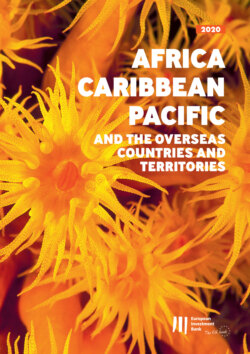Читать книгу EIB Activity in Africa, the Caribbean, the Pacific, and the Overseas Countries and Territories - Группа авторов - Страница 6
На сайте Литреса книга снята с продажи.
FOREWORD
ОглавлениеAmbroise Fayolle Vice-President European Investment Bank
Thomas Östros Vice-President European Investment Bank
For many of us, 2020 has been the most challenging year of our lifetimes. The COVID-19 pandemic has had grave consequences across the world. The loss of millions of people is by far the most serious consequence, but the effects of the pandemic on day-to-day life, on our economies and on global development will be felt for years to come. We must continue to work together in partnership. It is the only way that we can lessen the worst impacts of the crisis and emerge into a strong recovery.
We are putting our financing to work as part of Team Europe to increase assistance around the world and develop more partnerships. In 2020, EIB signatures in sub-Saharan Africa, the Caribbean and the Pacific, the Overseas Countries and Territories and South Africa reached €2.1 billion, for 47 projects, across all sources of financing. For the ACP Investment Facility alone, the figure is over €1 billion. These figures are our highest on record in the regions. Of our total investment, 71% went to less-developed countries and fragile states. This too is a record. We also approved loans for projects for just over €3 billion. This is another record. The Bank also disbursed €963 million. This is the second highest yearly total.
There are several ways in which institutions like ours can support recovery from a pandemic. In the healthcare sector, to help minimise the short-term impacts of COVID-19, the Bank has helped to finance vaccine research programmes. We have joined forces with the European Commission to support the COVAX programme to help everyone get access to vaccines. COVAX will offer affordable vaccines to as many as a billion people. We are also financing vaccine manufacturing, as well as providing funding to cover costs for staff and protective equipment. This work is building health resilience in several countries in sub-Saharan Africa.
We need to work harder on economic resilience and climate change mitigation and adaptation. Our experience in the fields of climate change mitigation and adaptation is significant, including not only large-scale wind and solar power generation, but also solar power kits in homes, small solar power parks in communities, and other off-grid power solutions. We also do a lot of work in energy efficiency and resilient water and sanitation infrastructure. The Africa, Caribbean and Pacific (ACP) regions are amongst the most threatened by climate change — ranging from environmental degradation to increased drought, flooding and coastal erosion — but they do not always have the resources to deal with these problems. The Bank can help to support these projects. This year, we are financing a large operation to tackle soil erosion in Nigeria, as well as several water projects in Malawi, Barbados and Burkina Faso.
The most effective way to reduce poverty around the world is to support private sector development. In the ACP regions, the EIB therefore places a premium on supporting financial ecosystems and sharing knowledge of best practices to enhance them. We help provide the necessary financing for businesses of all shapes and sizes, from startups and microenterprises up to large corporates. Smaller businesses are the drivers of the economy and the principal job creators. Local financial institutions enable these companies to grow. They need support now, more than ever, as they deal with the economic fallout of the COVID-19 pandemic. Special efforts also are needed to improve access to finance for people who are underserved: young people, rural populations and women.
We seek to invest where we can achieve the most impact. For every euro lent to a woman, the impact on the community is multiplied many times over. We are seeing this extra impact in many instances, especially through our SheInvest initiative focused on Africa. We have invested over €1 billion to help women and girls in Africa since November 2019 under SheInvest, improving access to finance for female-owned businesses in particular. Likewise, our focus on digitalisation creates opportunities for young people, women and rural populations by connecting them to essential services, financing, and customers.
The conditions to support private sector development have changed. If anything, the situation in 2020 has reinforced the point that public sector investment remains critical. It is here that the EIB and its partners, whether fellow European institutions, multilateral development banks or local and regional financial institutions, have had to demonstrate more flexibility. It is of vital importance that investment in emerging economies does not go down during this period, and the Bank has offered a lot of finance to countries in need. This has enabled initiatives that benefit the public good, such as investment in water and sanitation, clean energy and electricity distribution.
This is not the time to be restrictive in development finance. The UN Sustainable Development Goals seek to improve lives across the world by 2030. This is not far away, and calls for more partnerships and more action. In a few months in 2020, we demonstrated what we can do together as part of Team Europe. The Bank has been investing in Africa, the Caribbean and Pacific for almost 60 years. We are ready to do more than ever to improve lives, fight climate change, create opportunities for millions of women and men, and build a greener and smarter future, where pandemics and poverty can be addressed quickly by strong economies and resilient societies.
